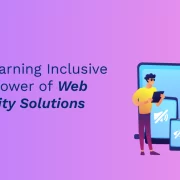
Online Learning Games – Making Remote Learning Fun for K12 Students
The recent pandemic has dramatically changed how students learn. Educational institutions have been pushed to conduct online classes to keep things as normal as possible for students.
Educational institutions have incorporated different learning techniques and tools to cope with this changed situation and make remote learning enjoyable.
Online learning games effectively keep learners engaged, motivated, and attentive to their lessons. Different educational games are incorporated into the curriculum to reduce monotony during remote learning.
Online games for students are especially conducive to improving their critical thinking capability while learning a particular subject. Games can even enhance their interest in a specific topic. Subjects like science and math are sometimes complicated to understand, but learning games can make them interesting and fun.
Table of Contents:
- Role of Online Learning Games in K12 Education
- Keeps the Learners Engaged
- Helps Retain Information
- Improves Soft Skills
- Beneficial for Students with Attention Disorders
- Teaches Other Skills
- Collaboration and Social Skills
- Customized Educational Experience
- Real-World Application of Knowledge
- Promotes Personalized Learning
- Supports Ongoing Assessment
- Factors to Consider While Incorporating Online Learning Games in K12 Curriculum
- Types of Learning Games Suitable for the K12 Curriculum
- Key Takeaways
Role of Online Learning Games in K12 Education
Here’s a closer look at how online learning games play a pivotal role in enhancing K12 education:
1. Keeps the Learners Engaged
The use of online games in learning is not only for fun but also to make distance learning fun and engaging for students. Learning games encourage students to actively participate in learning and keep them focused on their learning.
2. Helps Retain Information
Learning games are meant to provide knowledge through practical instances, where students understand concepts through participation in virtual scenarios. Instead of memorizing lessons, knowing how to make remote learning fun via online games allows students to practice critical theories by solving the problems of real-world situations.
3. Improves Soft Skills
Using games as a learning tool is an effective way to improve the learners’ soft skills. Each game comes with a set of predefined rules, and the learners need to understand and follow the rules to achieve a high score and move to the next level.
This organized system makes students focus on the conceptual part of learning and apply their knowledge to achieve success. So, learners focus on conceptual learning and its application rather than just knowledge gathering.
4. Beneficial for Students with Attention Disorders
Learning games are a good alternative to capture students’ attention, as they are much more interesting than traditional learning. Most students consider games a fun way of learning. In fact, research shows that online learning games can even help students who experience attention problems.
5. Teaches Other Skills
Games are collaborative; they can teach different skills like problem-solving, sportsmanship, interaction, and collaboration with peers. Some games require players to make quick decisions in a low-risk setting, which helps boost the learner’s confidence in tackling challenges later. These features make students more adaptive in any real-world situation.
6. Collaboration and Social Skills
Even in a virtual learning environment, your students still require opportunities to enhance their social and collaborative skills. K12 learning games frequently feature a multiplayer aspect that encourages teamwork.
Whether joining forces to crack a case in a detective game or collaborating on a project, students will cultivate vital communication and cooperation abilities.
These games contribute to a sense of community among students and can help diminish the feelings of isolation that some may experience during remote education. By integrating these games, you allow students the opportunity to cooperate and strengthen their relationships with classmates, even from afar.
7. Customized Educational Experience
Each student has a unique learning style, and virtual learning games enable you to offer a more customized educational experience.
Numerous online games provide different difficulty levels or permit students to advance at their own speed, helping them enjoy learning.
This flexibility is particularly advantageous in a K12 environment, where students might have varying levels of comprehension. You can adjust the games to align with each student’s specific learning needs, ensuring that everyone is sufficiently challenged without experiencing undue stress.
8. Real-World Application of Knowledge
Numerous virtual learning games replicate real-life situations, enabling students to implement their acquired knowledge in practical contexts.
For example, a game centered on financial literacy could allow students to oversee a virtual budget or engage in a simulated stock market. This experiential learning aids your students in grasping how the concepts are relevant in the real world.
9. Promotes Personalized Learning
K12 learning games are incredibly versatile and designed to meet the specific needs of each student. Numerous games employ data-driven algorithms to modify the difficulty based on a student’s performance, ensuring that the material remains challenging and attainable.
This personalization enables your students to progress at their rhythm, minimizing frustration and encouraging a sense of achievement. For example, students with difficulty may be given extra hints or easier tasks, while those who excel can engage with more intricate challenges.
10. Supports Ongoing Assessment
Online learning games have assessment features that give immediate insights into student performance.
Educators can monitor progress, pinpoint areas where students might be facing challenges, and adjust their instructional methods as needed. This continual evaluation ensures that learning goals are achieved in a timely and effective manner, helping to create a more adaptable and engaging educational experience.
Also Read: From Kindergarten to Graduation: The Lifelong Impact of K12 Learning Benefits
Factors to Consider While Incorporating Online Learning Games in K12 Curriculum
When you are planning to incorporate learning games into the curriculum, you need to consider multiple things, such as:
- Students’ Grade: When incorporating K12 learning games into your learning infrastructure, make sure they are compatible with the general intelligence of students of a particular grade.
- The Main Purpose of a Learning Game: Apart from being fun, learning games are intended to impart knowledge, develop soft skills, and improve knowledge retention.
- Type of Learning Game to Incorporate: Students should be provided with different types of games. Implementing similar kinds of games repetitively can lead to monotony.
- Expected Outcome: Learning games need to be structured in a way that can deliver the expected outcomes.
Apart from these, you need to be careful about course content, budget, and institutional culture before making an appropriate online learning game for a particular grade level.
Types of Learning Games Suitable for the K12 Curriculum
Below are the types of learning games that are particularly effective for enhancing the K12 curriculum:
1. Role-Play Games
In role-play games, learners must take on the role of a character. These games are designed with a strong narrative, and the students need to role-play, make decisions on behalf of the character, and complete the tasks. Online role-playing games are useful to improve the soft skills of learners and also help in empathy development.
2. Timed Games
In these games, students have to work against the clock to complete a challenge. Playing against time adds a new dimension to learning tasks. Timed games are designed to improve engagement and allow the learners to practice quick decision-making.
3. Collaborative Games
Collaborative games are designed to enhance the collaboration between learners. Here learners need to work together to finish a task. These games are good for improving the team-play spirit among learners.
4. Detective Games
These are quiz or puzzle-type games in which the learners explore the game and try to solve a mystery, puzzle, or challenge to complete a particular level. These types of online learning games are useful for developing the students’ problem-solving skills, checking their depth of knowledge, and testing their observation capacity.
5. Competitive Games
These games are designed to introduce healthy competition among learners and uplift the class’s overall performance. The learners compete as individuals or as teams, earn points, and win the challenge. Competitive games can be used as a performance-enhancing tool.
6. Simulations
Simulations are animated models that mimic real-life scenarios. These are instructional scenarios where students are placed in a virtual world defined by the teacher and have to interact within this virtual reality.
7. Mini-Games
These are short games designed to incorporate within or alongside the digital course content. These are the best options to support any particular lesson objectives.
8. Interactive Games
These games are designed with simple cause-and-effect interactions. These are helpful for learners to visualize or reinforce a key concept.
Also Read: Preparing K12 Students for Higher Education: Best Practices
Key Takeaways
In a remote learning scenario, engaging students in fun online learning games can boost the learning experience and help students engage better with the content.
Besides knowledge acquisition, online learning games help develop soft skills like critical thinking, communication, problem-solving, and decision-making. Therefore, educational institutions must consider incorporating learning games into the K12 curriculum to make learning fun for students.
At Hurix Digital, we offer advanced K12 solutions that enhance student engagement and support personalized learning experiences.
Our solutions are designed to boost creativity, collaboration, and critical thinking, ensuring that students retain knowledge and develop essential life skills. Let’s work together to make learning fun and effective!

Senior Vice President
A Business Development professional with >20 years of experience with strong capability to sell new solutions and develop new markets from scratch. New Market Entry Specialist with experience of working in two of the largest emerging markets – China & India. Also covered other key markets in APAC, US, EU & ME. Exceptional experience of conceptualizing, ideating and selling new learning technologies like VR AR, etc. across multiple industry verticals.



